Never Put on Your Shoes Before Doing This, Spider Experts Warn
Skipping this step could put you at risk of coming in contact with a dangerous spider.
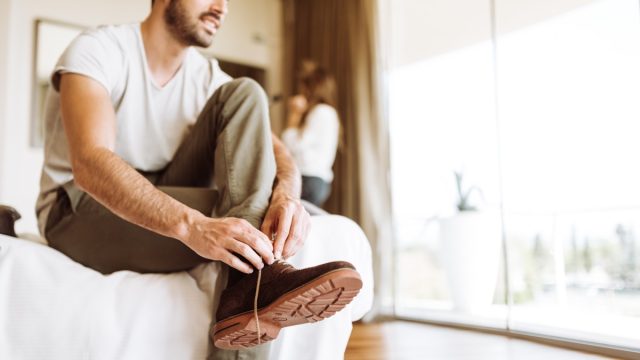
As the warmer weather slowly comes to an end, many of us are getting ready to get out our fall and winter wardrobes. Boots and closed-toe shoes will soon make a reappearance from the back of our closets, while our flip-flops and sandals will be stored away. But before you slip on your shoes, experts say you should exercise a bit of caution, as they could be the ultimate hiding spot for one particular and very dangerous spider. Read on to find out what spider experts say you should always do before putting on a pair of shoes that haven't been worn in a while.
RELATED: If You're Not Cleaning This, You're Inviting Spiders to Your Home.
A black widow could be hiding in a pair of your old shoes.
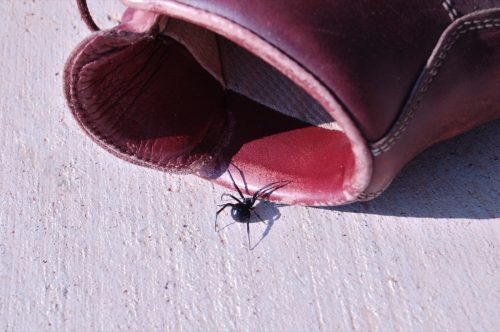
If you haven't worn a certain pair of shoes in a while, be wary. Thomas Marbut, the corporate trainer and general manager at Mosquito Squad, says that it is common for black widow spiders to climb into shoes that are not used often because they prefer a "dark and quiet habitat."
"Shoes and boots that are used on a daily basis are less likely to host a spider, because they are moved often and disturbed," he explains. "Storing them in a mudroom, basement, or garage can increase the risk of hosting a black widow, since these rooms are closely connected to outdoor exits and tend to be dark and undisturbed, which attracts black widows."
RELATED: The No. 1 Sign You Have Black Widows in Your Home, Experts Warn.
You should always shake out an old pair of shoes before putting them on.
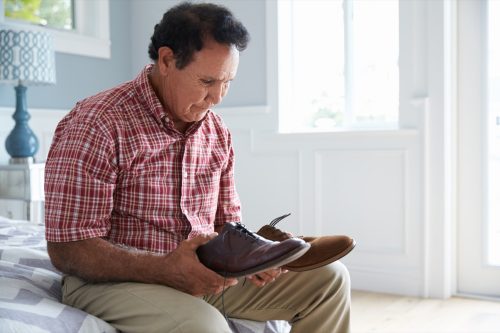
"You should always thoroughly shake out your shoes that haven't been worn in a significant amount of time in order to shake away any black widow that could be hiding," Marbut says. He also advises that you do the same for any shoes that have been left in a dark area or outdoors, even if they've been recently worn.
And while some experts like Marbut say a simple shake will do the trick, Michael Dean, a pest control expert and co-founder at Pools Research, actually recommends that you tap your shoes on the floor with the sole facing upwards. According to Dean, this makes it so you're less likely to end up with a spider on your hand or arm.
You may also notice a particular web near your shoe or around the opening of it if there is a black widow present, according to Marbut. "Finding a silken sac which holds their eggs is another way of knowing whether a black widow is living in your home or shoes," he says.
Storing your old shoes in a specific way may make them less prone to black widows.
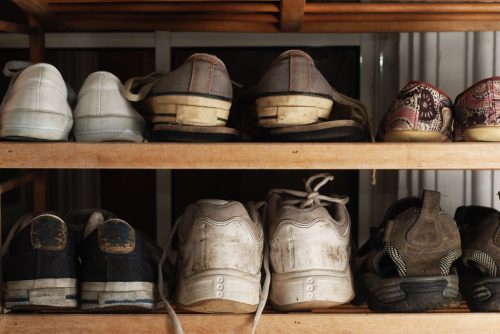
Depending on how you store your old shoes, you might be less likely to come in contact with a black widow spider. Marbut recommends keeping your shoes high up off the ground on either a shoe rack or shelving, as "black widows tend to move close to the ground," he explains.
Dean, on the other hand, advises storing old shoes in an air-tight container. "This might be a bit inconvenient, but if you've got shoes that are worn infrequently, or being stored away for a season in a space that is dark and warm, it's particularly pertinent," he explains.
RELATED: For more guidance on pests to avoid, sign up for our daily newsletter.
Black widow bites are painful and have notable symptoms.
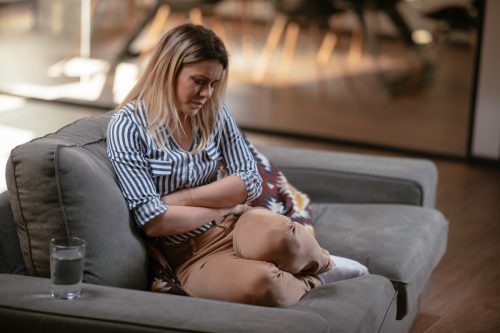
According to Marbut, one of the clearest signs a black widow has been hiding in your shoe is feeling the bite of it on your foot. Ryan Smith, a pest control expert and owner of Ant and Garden Organic Pest Control, says a black widow bite is typically "very painful and immediately felt." Symptoms of this spider's bite include fever, muscle spasms, sweating, and nausea, according to Smith. Other symptoms may include redness, pain, swelling, cramping, and tumors, per the Mayo Clinic. These symptoms could last up to three days, but you should always seek medical care immediately if you believe you have been bitten by a black widow, as some people with weakened immune systems or smaller body masses can experience severe complications to their nervous system after being bitten.
RELATED: The No. 1 Sign There's a Tarantula in Your Home, Experts Warn.





















